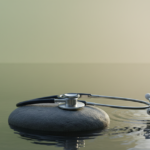In medical school, we are taught how to recognize the signs of depression, how to assess for suicidal ideation, and how to document risk. We memorize screening tools, safety plans, and algorithms. But what we rarely learn, if at all, is how to hold the emotional weight of these encounters. We are not formally taught emotional literacy. Some may argue that emotional literacy can be learned informally over time, but without intentional guidance, we risk learning it through personal loss, detachment and burnout, rather than through reflection, support, and practice. And in a health care system that is increasingly prioritizing efficiency over empathy, we may begin to confuse emotional suppression for professionalism, leaving us ill-equipped to show up fully for the people we serve, or process what we carry ourselves.
This gap becomes most apparent to many students during their psychiatry clerkships, particularly when working with suicidal patients. Students quickly realize that these are emotionally charged, deeply human conversations, but more importantly, that the rehearsed scripts and safety checklists only go so far. Eventually, the questions run out, and what is left is a silence that requires presence, not a checklist; something many of us were never taught how to navigate. I remember one of my first such patients, admitted after a suicide attempt. I had rehearsed the questions and safety assessments, but once I was in the room, I felt lost. When they quietly said, “I do not think I will ever feel OK,” I did not know what to say. I worried that anything I said might make things worse. I was afraid I would overstep. I considered deferring to someone more senior, someone who had the right words. Instead, I said very little. So, I nodded, took notes, and checked boxes on paper. Afterwards, I was left with a heavy silence and a guilt that I was not good enough to be there to have that conversation.
Medical education prepares us well to diagnose and treat. But it does not prepare us to feel. It does not teach us how to sit with pain, how to hold space for suffering, or how to acknowledge our own emotions without shame. Yet emotional literacy and presence are vital clinical skills. They are essential for good patient care, especially in psychiatry, but across all specialties. Grief is a particularly powerful example. When patients die, especially by suicide, we are left with profound loss. The severance of a therapeutic alliance by suicide is a special kind of loss: one we rarely talk about. Yet there is no formal education in grief or bereavement in most medical schools. No structured time to reflect, to mourn, or to learn how to carry that grief and still show up for the next patient. Often, the responsibility to process such a loss falls on the student to navigate alone, with limited support, if any. And when that support is missing, the cost can be high.
When we fail to teach emotional literacy formally and equip medical students with tools they can use in various settings, we teach detachment and risk appearing emotionless in front of our patients. And before you know it, you will have a student (like I was) who sits there, nods, jots notes down, without ever being fully invested in the conversation at hand.
Without emotional literacy, students risk hardening themselves. They risk burnout and a gradual loss of empathy that harms patients and clinicians alike. Learning to hold emotional pain with care is a skill that takes practice and mentorship. It requires safe spaces to reflect, to share, and to grow. And I argue that it can absolutely be taught.
Medical students deserve curricula that include emotional literacy alongside all the other courses that prepare us to be outstanding clinicians. We deserve dedicated simulations, role-playing, and debriefing sessions focused not just on clinical knowledge, but also on how to listen deeply, respond compassionately, and be present even when it feels uncomfortable. We must teach students how to stay in the room and address suffering without turning away or shutting down. We must give them the necessary language to express uncertainty, and the courage to show vulnerability. This is how we train doctors who begin to heal, not just diagnose.
Emotional literacy is as much a vital part of medicine as tangible clinical skills. It is part of the science and art of caring for another human being. If we want better doctors and better patient outcomes, medical education must stop treating emotional skills as optional. It is time to make emotional literacy a core clinical competency.
Vineet Vishwanath is a medical student.




















![AI censorship threatens the lifeline of caregiver support [PODCAST]](https://kevinmd.com/wp-content/uploads/Design-2-190x100.jpg)
